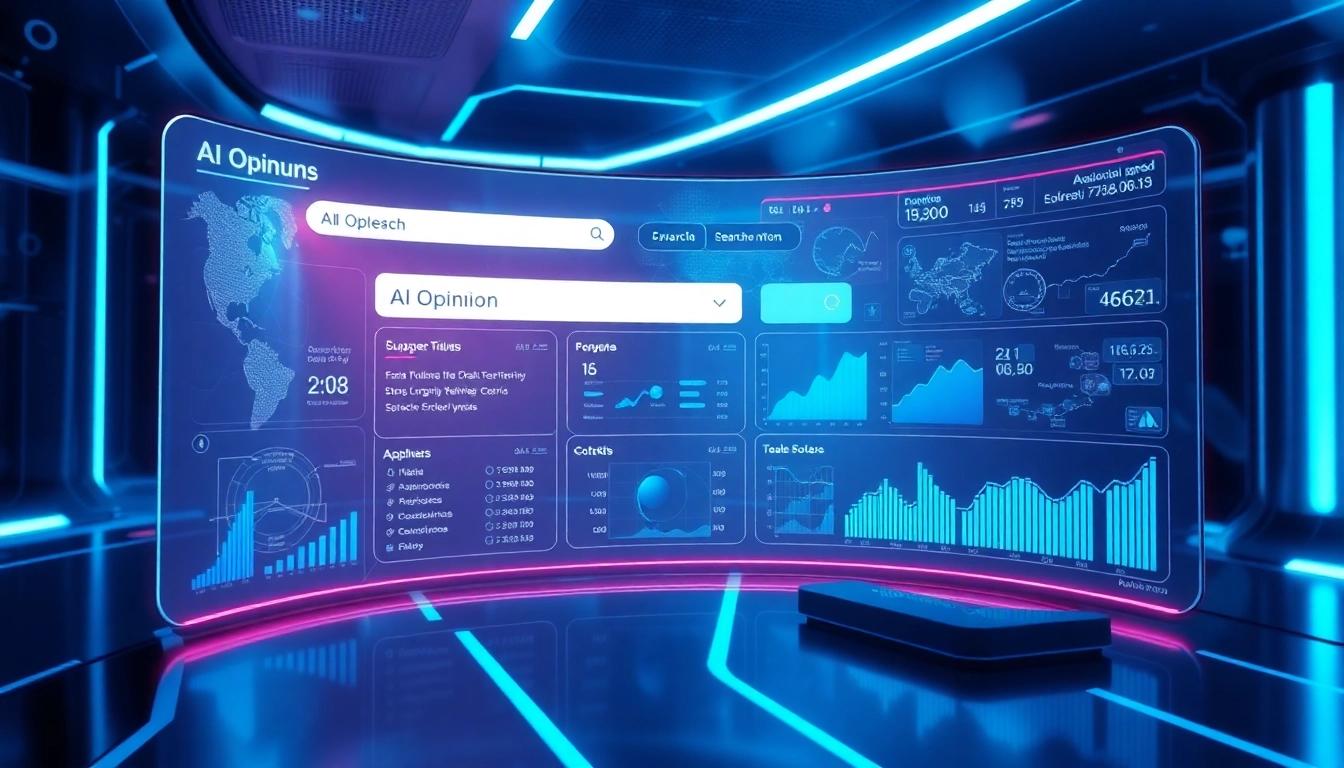Understanding AI Opinion Search
In the digital age, the sheer volume of information available can be overwhelming, specifically in academic and professional research contexts. Traditional search engines often fall short in helping users sift through this ocean of data to find not just relevant material but nuanced insights, opinions, and analyses. This is where AI Opinion search technology steps in, offering tools that leverage artificial intelligence to enhance the search process by delivering tailored results based on user intent and contextual relevance.
What is AI Opinion Search?
AI Opinion Search refers to a category of search technology that utilizes artificial intelligence algorithms to analyze and synthesize vast amounts of data and literature to derive insights, trends, opinions, and sentiments about various topics. Unlike conventional search engines that merely index content based on keywords, AI Opinion Search tools are designed to understand the context and extract meaningful insights that can assist researchers, academicians, and professionals.
How It Works: The Technology Behind
The foundation of AI Opinion Search lies in complex machine learning algorithms and natural language processing (NLP) techniques. These technologies allow the AI to analyze textual data not just for its surface content but also for sentiment, tone, and relevance. Here’s a brief overview of how the technology works:
- Data Collection: AI Opinion Search tools collect data from a myriad of sources, including research papers, articles, opinion pieces, and social media platforms.
- Natural Language Processing: NLP techniques are employed to understand and interpret human language, enabling the AI to decipher meaning and context beyond simple keywords.
- Sentiment Analysis: The technology assesses the emotional tone behind a series of words, helping to determine a piece’s opinion, whether it’s positive, negative, or neutral.
- Result Synthesis: Finally, the tool synthesizes the information gathered and presents it in an organized and succinct manner, often highlighting differing opinions and providing a balanced view on the topic.
Key Benefits for Researchers and Professionals
Utilizing AI Opinion Search technology brings several benefits to researchers and professionals:
- Efficiency: The ability to analyze large datasets quickly means researchers can save time while conducting literature reviews and gathering insights.
- Quality of Insights: With sophisticated algorithms at work, users receive more nuanced perspectives that facilitate deeper understanding rather than just surface-level information.
- Enhanced Decision Making: For professionals, having access to a spectrum of opinions helps in making informed decisions based on diverse viewpoints.
- Competitor Analysis: Businesses can utilize these tools for market research, understanding trends, and gauging public opinion on various topics.
Applications of AI Opinion Search
AI Opinion Search has significant applications across various domains, enhancing the way users interact with information and make decisions. Let’s explore these applications in detail.
Academic Research and Literature Review
In academia, conducting literature reviews can be a time-consuming task. AI Opinion Search tools streamline this process by providing a comprehensive overview of existing research, highlighting key papers, and presenting differing opinions on the subject matter. For instance, researchers can search for specific keywords, and the tool will return papers that not only contain those words but also provide a sentiment analysis of the findings. This approach leads to a more holistic understanding of the topic at hand.
Business Intelligence and Market Research
In the business sector, AI Opinion Search facilitates market analysis by extracting valuable insights regarding public sentiment, brand perception, and emerging trends. Companies can use these insights to fine-tune their strategies and remain competitive. For example, a company launching a new product can acquire feedback and opinions from potential customers before the product release, aiding in more effective positioning and marketing strategies.
Personalized User Experiences
Another innovative application of AI Opinion Search is its potential to create personalized user experiences. By analyzing user behavior and preferences, AI can provide customized content recommendations that align with an individual’s interests. This is particularly beneficial in fields such as e-commerce, media streaming, and online education, where understanding user opinions greatly enhances engagement and satisfaction.
Choosing the Right AI Opinion Search Tool
With numerous AI Opinion Search tools available, selecting the right one for your needs can be challenging. A well-informed choice can significantly impact the efficiency and relevance of the insights you gather. Here’s a guide to facilitate your decision-making process.
Comparison of Leading Tools and Platforms
Some notable AI Opinion Search tools include:
- Consensus: A robust academic search engine that allows users to find research papers and synthesize opinions based on scientific literature.
- Semantic Scholar: This platform employs AI to empower scholarly research, assisting professionals in discovering relevant papers effectively.
- Scite: This tool specializes in analyzing citations to determine how a paper has been cited, indicating whether it is supportive, opposing, or neutral.
- Elicit: Designed for academic and business applications, Elicit thrives on providing insights by summarizing and extracting data from over 125 million research papers.
Evaluating Features and Usability
When evaluating AI Opinion Search tools, consider the following features:
- Usability: The interface should be intuitive and user-friendly. Complicated navigation can deter productivity.
- Search Capabilities: Look for advanced search features such as filtering by relevance, date, and sentiment.
- Integration: Check if the tool can be integrated within existing workflows or with other software tools to enhance usability.
- Data Sources: A rich variety of data sources will yield comprehensive insights; therefore, evaluate where the tool gathers its information.
Cost Considerations and Free Trials
Cost is often a significant factor in choosing an AI Opinion Search tool. While some platforms offer free access, premium features often come with subscription costs. It’s wise to take advantage of free trials to understand the value provided before committing financially. Additionally, assess your budget and the potential return on investment — especially if the tool could potentially save significant time or improve decision-making processes.
Best Practices for Effective Use
To maximize the benefits of AI Opinion Search, consider implementing the following best practices:
Optimizing Search Queries for Better Results
Crafting precise and relevant search queries is critical in obtaining quality results. Here are some tips for optimization:
- Be Specific: Use detailed phrases instead of generic search terms. For example, instead of searching for “climate change,” you might search for “public opinion on climate change legislation.”
- Use Filters: Take advantage of the filtering options to narrow down results to specific dates, publications, or research types.
- Incorporate Synonyms: Expand your query with synonyms or related questions, increasing the chances of retrieving relevant insights.
Integrating AI Opinion Search into Your Workflow
To fully leverage the power of AI Opinion Search, integrate it into your existing workflows. This could involve:
- Regular Use: Make AI Opinion Search a regular part of your research or decision-making routine, ensuring that you stay updated with the latest insights.
- Collaboration: Share findings with colleagues or stakeholders to foster discussion and collaborative decision-making.
- Documentation: Keep records of findings and insights to build a database that can be referred back to for strategic planning.
Metrics for Measuring Success
Establish clear metrics to evaluate the success of the insights garnered through AI Opinion Search. Some metrics to consider include:
- Relevance: How applicable are the insights to your research questions or business decisions?
- Efficiency: Measure the time saved in gathering insights compared to traditional research methods.
- User Engagement: If applicable, assess how well the insights resonate with your audience or contribute to discussions.
The Future of AI Opinion Search Technology
As technology evolves, so too will the capabilities of AI Opinion Search. Understanding emerging trends and potential challenges is vital for anyone looking to leverage these tools effectively.
Emerging Trends in AI and Data Analysis
The future of AI Opinion Search will likely be shaped by several key trends:
- Improved Contextual Understanding: As AI technologies advance, tools will better understand the nuances of language, leading to more accurate sentiment analysis and opinion extraction.
- Integration with Other Tech: AI Opinion Search technologies may start to integrate with other forms of AI like generative AI and machine learning, leading to richer insights.
- Real-time Analysis: The capability for real-time sentiment and opinion analysis will significantly enhance the ability to respond quickly to emerging issues and trends.
Ethical Considerations and Challenges
While AI Opinion Search has immense potential, it also presents ethical challenges, such as:
- Data Privacy: The collection of personal data used by AI systems raises significant privacy issues that need to be addressed.
- Bias in Algorithms: AI tools risk perpetuating biases present in training data; ensuring AI neutrality is vital for fair and accurate results.
- Dependence on Technology: With the ease of access, there is a risk that users might over-rely on AI insights, potentially leading to missed nuances and reduced critical thinking.
Transforming Research and Knowledge Sharing
The transformative potential of AI Opinion Search technology cannot be overstated. As the academic and professional landscape shifts toward more data-driven decision-making, these tools will play a pivotal role in shaping how knowledge is shared and consumed. By facilitating access to diverse perspectives and insights, AI Opinion Search has the power to redefine the pathways through which information flows across various sectors, enhancing collaboration, innovation, and understanding.



